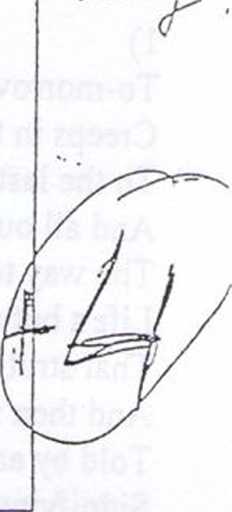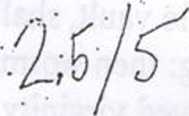Obraz0010 (2)
uU
] Identify the following excerpts (provide the title, the literary period to which a given work belongs) words.
the name of the author- when applicsble - and the name of Answer one accompanying ąuestion in approxLmately 100
)
; this the region, this the soil, the clime,
aid then the lost Archangel, this the seat
hat we must change for Heaven?-this moumful gloom
or that celestial light? Be it so, sińce he
•/ho now is sovereign can dispose and bid
Vhat shall be right: farthest from him is best
/hom reason hath equalled, force hath madę supremę • .
.bove his e'quals. Farewell, happy fields, • .•
/here joy for ever dwells! Hail, horrors! hail,
Tema) world! ar^d thou, profoundestHell,
.eceive thy new possessor— one who brings * mind not to be changed by place or time.
The mind is its own place, and in itself Can make a Heaven of Heli, a Heli of Heaven. What matter where, ifl be still the same,
And what I shouldbe, all but less than he \Vhom thunder hath madę greater? Here at least We shall be free; th* Almighty hath not built Here for his envy, will not drive us hence:
Here we may reign secure; and, in my choice, Tó reign is worth ambition, though in Heli: Better to reign in Heli than serve in Heaven.

Should these words be treated as a proof of heroism or stubbom foolishness? Justify your opLnion.
[a^ . r i-/ a i O fi . j . . o Ia. <. . fi a - _ . n
\ <To ^
lut at my back I alwaysmear A *
‘ime's winged chariot hurrying near;
\nd yonder all before us lie )eserts of vast eternity.
'hy beauty shall no morę be found,
!or, in thy marble vault, shall sound •ly echoing song: then worms shall tiy ‘hat long preserved virginity, • vnd your auaint honour tum to dusi md into ashes all my lust:
’he grave's a fine and private place, lut nonę, I think, do there embrace.
.§coł-o-^_ OA-^Oz-t ftvc_fc itr&zą o->. C-^v b-c*~
•p-W oX Cteot y^- -WOo ZAisjsJ. i-o Ccc.;
€-Ooi UouoL /irhrZJ^CjsH^ Ht. Wtto
cu^ol £b <^Cu^Jr
'T&z iu LoJ. /KJt ol W , Ht. ^UxxZ /C",
^ -^J-oast ht&lL cr&śsrt. lAJ~ Ias&joI fe /i-rO^o/w t ck,
ik. bsrai^ol c>~. Sn-to^ IU*- -p-teo
oLuJcUjok p
'j.T'. ... j1 ^

to . c7"


)
here
wo(Ai, VHxł< , oJrgiuS
K&yA- Ł "Aa. Jp-/ A.'O^T I
Place the above quoted excerpt in the context of the whole poem. Explain in what way(s) images evoked
in "fnm/ar/l fhe- cnpaVpr’c ormimpnf _ _. .„ — v! . t~ j .. r\« -^Cc-
help to forward the speaker’s argument.
4{. ( 1
/v«0
o-morrow, and to-morrow, and to-morro\v, Ireeps in this petty pace from day to day ■'o the last syllabie of recorded time,
Ynd all our yesterdays have lighted fools "he way to dusty dcath. Out, out, bricf candlc! ńfe’s but a walking shadow, a poor player fhat struts and frets his hour upon the stage \jid then is heard no morę: it is a tale fold by an idiot, fuli of sound and fury,
- w ___ v _ ___^ ^ ^ j\yO^~ ~ I
j\Od^ -6v!, OŁŁoOrvte^i f
L.'\sZ,cJ. ^cv </OOO y ło^ _ -Ju J; <^'ŁI-'r
W ctt ■Ccok Zcfc*. ę* UdJ. cJsJt. ! ,
l^r Ledjidckj 'uiU U- o. tó A
^K/o-zt- tv<_ /■~rloc^U/UyJ-oJ 'tato a^ocT
■jic k/o Scs-crjf-pt; h"t- 6^-Oh h-"-c'v
rn^Jr' fo 7--- ''
/(^-o
»7o
l-u. 4/ru tko
'ignifying nothing.
t is the speaker’s attitude towards life? \Vhat might have led to it? (Basc your answer on the knowledge of the
leWOrk)- ■ .W ^ •• ‘
, /Otc. VvSfc -wł l “yf ;Ua%b'" A?,-
-■ tó^/tru^ ' ir^U, WUT -a« MCC
ocojjoi
Vj> /
Z/. .
f/ * * V/
V w
/
Wyszukiwarka
Podobne podstrony:
Obraz0009 (2) I Identify the following excerpts (provide tlie title, the nanie of the author - when
41844 Obraz0009 (2) I Identify the following excerpts (provide tlie title, the nanie of the author -
Obraz0009 (2) I Identify the following excerpts (provide tlie title, the nanie of the author - when
41844 Obraz0009 (2) I Identify the following excerpts (provide tlie title, the nanie of the author -
Obraz0003 (3) I Identify the following excerpts (provide the title, the name of the author - when ap
Obraz0003 (3) I Identify the following excerpts (provide the title, the name of the author - when ap
Obraz0003 (3) I Identify the following excerpts (provide the title, the name of the author - when ap
76367 Obraz0015 III Identify the following passages (give the title, the name of the author and an a
Specifying the Time Period for Which to Display Statistics In the Real-Time: Last Hour modę, thc dat
Obraz0006 (3) w III Answer the following ąuestions in the space provided 1. Discuss the rnain differ
Replication Features and Issues The following sections provide information about what is supported a
DSC04977 12.2 For each of the following situations, identify the response variable
Host Na mes Host names are used in virtually all TCP/IP environments. The following list provides a
Methods of energy input In a generał electromagnetic system we can identify the following methods of
test 2 literatura brytyjska Identify the sources for the followng fragments (give the author, title
więcej podobnych podstron